As the North Atlantic Treaty Organization (NATO) celebrates its 70th anniversary this month, Americans overwhelmingly say being a member of NATO is beneficial for the United States.
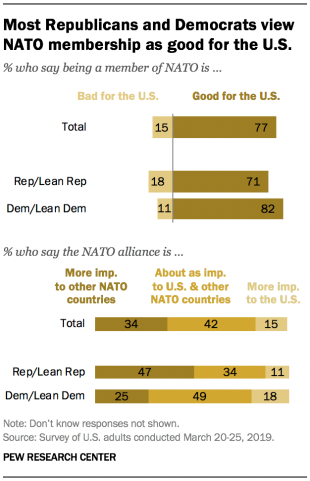 Nearly eight-in-ten Americans (77%) – including large majorities in both parties – say being a member of NATO is good for the United States. These numbers are essentially unchanged from April 2016.
Nearly eight-in-ten Americans (77%) – including large majorities in both parties – say being a member of NATO is good for the United States. These numbers are essentially unchanged from April 2016.
However, the public is more divided about whether the NATO alliance is more important to the United States or other NATO countries. A plurality of the public (42%) says NATO is about as important to the U.S. as it is to other NATO countries. About a third (34%) say the alliance is more important to other NATO countries, while just 15% say it is more important to the U.S.
While they agree that NATO membership is good for the U.S., Republicans and Democrats differ over the alliance’s importance to its members. Nearly half of Republicans and Republican-leaning independents (47%) say NATO is more important to other NATO countries than the U.S.; only a quarter of Democrats and Democratic leaners say the same. These views also are little changed since 2016, during the presidential campaign.
The survey by Pew Research Center, conducted March 20-25 among 1,503 adults, also finds:
- Americans remain divided on whether the U.S. should have an active role in the world: 49% say the United States should pay less attention to problems overseas and concentrate on problems here at home. A somewhat smaller share (44%) says it’s best for the future if the U.S. is active in world affairs. These views are little changed from two years ago, but in 2014 a majority said the U.S. should focus less on international problems.
- A majority of the public (54%) says the U.S. should take into account the interests of U.S. allies even if means making compromises with them; 40% say the U.S. should follow its national interests “even when its allies strongly disagree.” As in recent years, Democrats are far more likely than Republicans to favor cooperating with allies even if it means compromising with them.
Partisan gap over whether U.S. should be active in world affairs
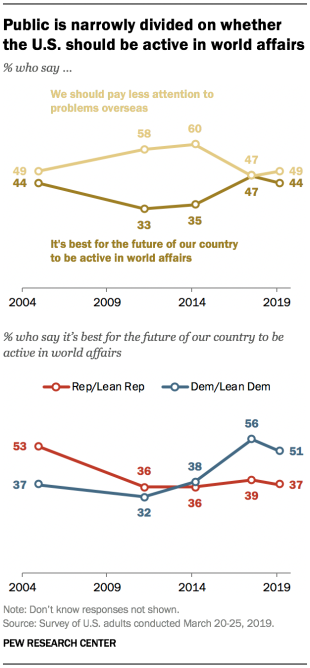 Over the past five years, Democrats have shifted toward favoring an active U.S. presence in world affairs. Today, 51% of Democrats and Democratic leaners say it’s best for the country to be active in world affairs. A somewhat smaller share of Democrats (43%) say the country should focus on problems here at home. These views have changed little since 2017, but in 2014 only 38% of Democrats said it was best for the future of the U.S. for it to be active globally.
Over the past five years, Democrats have shifted toward favoring an active U.S. presence in world affairs. Today, 51% of Democrats and Democratic leaners say it’s best for the country to be active in world affairs. A somewhat smaller share of Democrats (43%) say the country should focus on problems here at home. These views have changed little since 2017, but in 2014 only 38% of Democrats said it was best for the future of the U.S. for it to be active globally.
Among Republicans and Republican leaners, a majority (57%) continues to favor the U.S. paying less attention to problems overseas and focusing domestically. About four-in-ten (37%) say the country should be active in world affairs, which is largely unchanged since 2011.
More whites favor an active U.S. presence in world affairs than blacks or Hispanics. About half of white Americans (49%) say its best for the country to be active in world affairs, but just 39% of Hispanics and 29% of blacks say the same.
Support for an active U.S. role in world affairs is concentrated among white Democrats: 63% of white Democrats and Democratic leaners say the U.S. should be active globally, while just 39% of white Republicans say the same. Among nonwhite Democrats, fewer than half (38%) support an active U.S. role, placing their views closer to those of white Republicans than white Democrats.
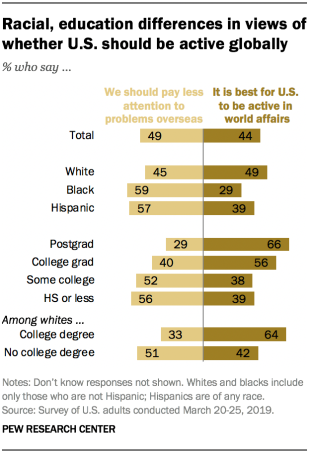 More educated Americans are the most supportive of an active U.S. presence on the world stage. A strong majority of those with a postgraduate degree (66%) say the U.S. should be active globally, compared to 29% saying it should concentrate on domestic problems. Those who have a four-year college degree are more narrowly divided, but a majority favors an active U.S. global role (56% active vs. 40% pay less attention).
More educated Americans are the most supportive of an active U.S. presence on the world stage. A strong majority of those with a postgraduate degree (66%) say the U.S. should be active globally, compared to 29% saying it should concentrate on domestic problems. Those who have a four-year college degree are more narrowly divided, but a majority favors an active U.S. global role (56% active vs. 40% pay less attention).
Americans who have not completed college tend to favor paying less attention to problems overseas and concentrating here at home. Larger shares of those with some college experience (52% vs. 38%) and those with a high school degree or less (56% vs. 39%) say we should pay less attention overseas than say it’s best to be active in world affairs.
Whites without a college degree are skeptical of an active U.S. presence in world affairs. About half of whites without a college degree (51%) say the U.S. should pay less attention to problems overseas. Most whites with a college degree take the opposite view (64% say U.S. should be active in world affairs); only a third say we should pay less attention to international problems.
Older adults are somewhat more likely than younger people to support the U.S. being active in world affairs: 48% of those age 50 and older say it’s best for the future to be active globally, compared with 41% among those ages 18 to 49.
Views of U.S. relationship with its allies
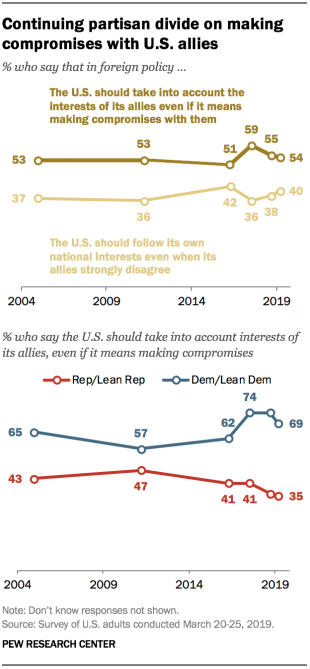 A majority of Americans (54%) say “the U.S. should take into account the interests of its allies even if it means making compromises with them,” while 40% say “the U.S. should follow its own national interests even when its allies strongly disagree.”
A majority of Americans (54%) say “the U.S. should take into account the interests of its allies even if it means making compromises with them,” while 40% say “the U.S. should follow its own national interests even when its allies strongly disagree.”
A wide partisan gap remains on how accommodating the U.S. should be toward its allies. A strong majority of Democrats and Democratic leaners (69%) say the U.S. should compromise with allies. About half as many Republicans and Republican leaners (35%) say the same.
Younger and more educated Americans are more supportive of the U.S. compromising with its allies than older adults and those with less education.
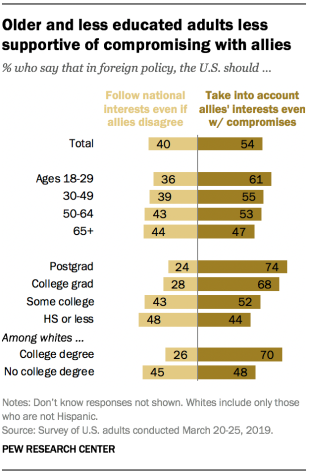 A majority of those age 18 to 29 (61%) say the U.S. should take into account allies’ interests even if it means making compromises. Only about a third (36%) say the U.S. should follow its own interests when allies strongly disagree. Adults age 65 and older are about evenly divided (47% vs. 44%).
A majority of those age 18 to 29 (61%) say the U.S. should take into account allies’ interests even if it means making compromises. Only about a third (36%) say the U.S. should follow its own interests when allies strongly disagree. Adults age 65 and older are about evenly divided (47% vs. 44%).
Large majorities of postgraduates (74%) and four-year college graduates (68%) say the U.S. should take allies’ interests into account. About half of those with some college education (52%) and 44% of those with a high school education or less agree.
Whites without a college degree are about equally divided between compromising with allies (48%) and following U.S. national interests when allies disagree (45%). College-educated whites largely favor taking into account allies’ interests and compromising when necessary (70% say this).
Most say world problems would be worse without the U.S.
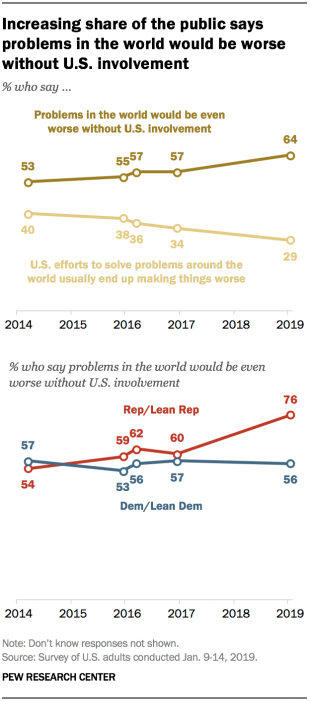 A large majority of Americans (64%) say that problems in the world would be worse without U.S. involvement, in a separate survey conducted in January. About three-in-ten (29%) say that U.S. involvement in the world generally hurts more than it helps.
A large majority of Americans (64%) say that problems in the world would be worse without U.S. involvement, in a separate survey conducted in January. About three-in-ten (29%) say that U.S. involvement in the world generally hurts more than it helps.
Since 2016, the share of Americans who say global problems would be worse without U.S. involvement has increased seven percentage points, from 57% to 64%. All of the change has come among NATO Foreign policy for releaseRepublicans and Republican-leaning independents: Currently, 76% say problems would worse without U.S. involvement, up from 60% three years ago.
Democrats’ views are little changed over this period. In the January survey, 56% of Democrats and Democratic leaners say world problems would be worse without U.S. involvement.
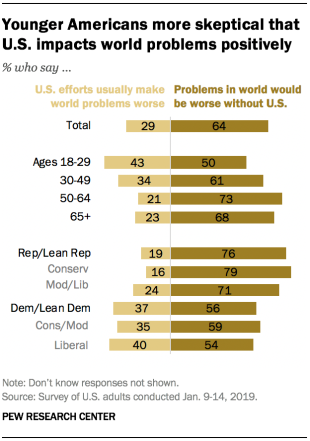 Younger Americans are more likely to say that U.S. involvement in the world usually makes problems worse compared with those 50 and older. Those under 30 are about evenly divided with 43% saying that U.S. involvement usually makes problems worse, and 50% saying that things would be even worse without U.S. involvement.
Younger Americans are more likely to say that U.S. involvement in the world usually makes problems worse compared with those 50 and older. Those under 30 are about evenly divided with 43% saying that U.S. involvement usually makes problems worse, and 50% saying that things would be even worse without U.S. involvement.
While there are partisan differences in these attitudes, there are no ideological divides within the parties on the question of whether the U.S. does more harm than good on the international stage.


